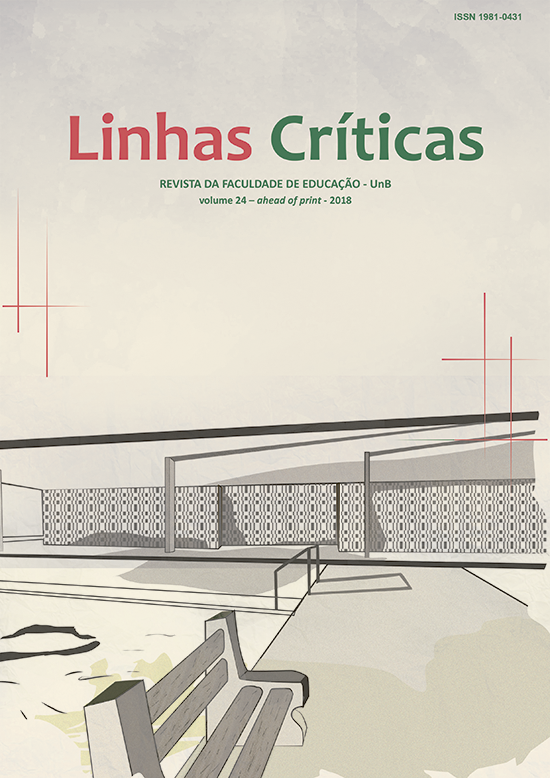Post-it
Biographical narratives and chronic diseases
DOI:
https://doi.org/10.26512/lc.v24i0.18956Keywords:
Research (auto) biographical. Chronic diseases. HIV/AIDS. Learning with the disease.Abstract
The text analyzes the narratives published in the ‘Saber Viver’ Journal, in the ‘Tell
your story’ section, which regards HIV/AIDS, by discussing experiences with the
disease, the biographical learning processes and the ways of living with chronicity.
The theoretical dispositions of the (auto)biographical approach are mobilized for
the analysis of the narratives, as a source of research, as far as it concerns the
experiences of the subjects with the illness. Furthermore, the reflection aims to
discuss questions about the processes of production, circulation and reception
of the journal, by evincing the ruptures and reconfigurations which are part of a
chronic disease experience, the provisions built by each subject to live with HIV/
AIDS and the representations about the disease.
Downloads
References
Dando a volta por cima. Revista Saber Viver, Rio de Janeiro, Ano 2, n. 08, p. 11, dez. 2000; jan./fev. 2001. Disponível em: http://www.saberviver.org.br/index.php?g_edicao=depoimento008 Acessado em 20 ago. 2017.
Delory-Momberger, C. (2016). A experiência da doença: um tocar do existir. Revista da Faeeba – Educação e Contemporaneidade. V. 25, n. 46, p. 25-31.
Delory-Momberger, C. (2013). Expérience de la maladie et reconfigurations biografhiques. Revista Education Permanente, Paris, CNAM, n. 195, 2, p. 121-131.
Delory-Momberger, C. (2012). Abordagem metodológica na pesquisa biográfica. Revista Brasileira de Educação, v. 17, n. 51, p. 523-740.
Delory-Momberger, c. & Tourette-Turgis, C. (2014). Vivre avec la maladie: expériences, épreuves, résistances. Le sujet dans la cité – Revue Internationale de Recherche Biographique, Paris, L’Harmattan, n. 5, p. 134-38.
Encontrar a pessoa ideal não é fácil para ninguém. Revista Saber Viver, Rio de Janeiro, Ano 1, n. 04, p. 8, abr./mai. 2000. Disponível em: http://www.saberviver.org.br/index.php?g_edicao=comportamento004 Acesso em: 20 ago. 2017.
“Estou me preparando para contar para minha filha que ela tem o vírus da Aids”. Revista Saber Viver, Rio de Janeiro, Ano 1, n. 2, p. 8, dez./jan. 1999/2000. Disponível em: http://www.saberviver.org.br/index.php?g_edicao=comportamento002 Acesso em: 20 ago. 2017.
Grávida e soropositiva. Revista Saber Viver, Rio de Janeiro, Ano 1, n. 05, p. 8-9, jun./jul. 2000. Disponível em: <http://www.saberviver.org.br/index.php?g_ edicao=comportamento005>. Acesso em: 20 ago. 2017.
O pavor da discriminação. Revista Saber Viver, Rio de Janeiro, Ano 1, n. 06, p. 8-9, ago./set. 2000. Disponível em: <http://www.saberviver.org.br/index.php?g_edicao=comportamento006>. Acesso em: 20 ago. 2017.
Paulo-Pereira, L.; Tourette-Turgis, C. (2016). Quand mon corps parle, qu’est-ce que j’apprendes? In. Delory-Momberger, C. (dir). Éprouver le corps: corps appris, corps apprenant. pp. 203-214, Paris: Èrès.
Souza, E. C. (2016). Existir para resistir: (auto)biografia, narrativas e aprendizagens com a doença. Revista da Faeeba – Educação e Contemporaneidade. V. 25, n. 46, p. 59-74.
Souza, E. C. (2014a). “Tentativa de exploração e de interpretação do estar-no-mundo: discursos, poderes e fabricação de identidade. In.: Souza, E.C.; Balssiano, A.L.; Oliveira, A-M. (Orgs). Escrita de si, resistência e empoderamento. pp. 115-138. Curitiba, PR: Editora CRV.
Souza, E. C. (2014b). “Savoir vivre” avec la maladie: apprentissages biographiques et récits de résistances. Le sujet dans la cité – Revue Internationale de Recherche Biographique, Paris, L’Harmattan, n. 5, p. 138-148.
Souza, E. C. (2014c). Diálogos cruzados sobre pesquisa (auto)biográfica: análise compreensiva-interpretativa e política de sentido. Educação/Santa Maria, v. 39, n. 01, p. 39-50.
Tenho o HIV, porém feliz. Revista Saber Viver, Rio de Janeiro, Ano 2, n. 12, p. 12, set./out. 2001. Disponível em: <http://www.saberviver.org.br/index.php?g_ edicao=depoimento012>. Acesso em: 20 ago. 2017.
Tourette-Turgis, C. (2015). L’education thérapeutique du patients: la maladie comme occasion d’aprentissage. Louvain-la-Neuve: De Boeck.
Tourette-Turgis, C. (2013). Dossier Aprendre du malade. Education Permanente, Paris, CNAM, n. 195.
Tourette-Turgis, C.; Paulo-Pereira, L. (2016). Reconhecer a experiência e a expertise do doente: um dispositivo inovador: a Universidade dos Pacientes. Revista da Faeeba – Educação e Contemporaneidade. V. 25, n. 46, p. 33-44.
Tourette-Turgis, C.; Thievenaz, J. (2014) L’education thérapeutique du patient: champ de pratique et champ de recherché. Savoirs – Revue Internationale de Recherches en Éducation et en Formation des Adultes, Paris, L’Harmattan, n. 35, p. 11-48.
Vianna, H. (1988). ‘Quase um segundo’ – Os Paralamas do Sucesso. São Paulo: Gravadora EMI.
Vontade de viver. Revista Saber Viver, Rio de Janeiro, Ano 6, n. 35, p. 11, jan./fev./mar. 2006. Disponível em: < http://www.saberviver.org.br/index.php?g_edicao=sua_historia035 Acesso em: 20 ago. 2017.
Published
How to Cite
Issue
Section
License
Copyright (c) 2018 Revista Linhas Críticas

This work is licensed under a Creative Commons Attribution 4.0 International License.
Authors who publish in this journal agree to the following terms:
-Authors maintains the copyright and grants the journal the right of first publication, the work being simultaneously licensed under the Creative Commons Attribution License which allows the sharing of the work with recognition of the authorship of the work and initial publication in this journal.
- Authors are authorized to enter into additional contracts separately, for non-exclusive distribution of the version of the work published in this journal (eg publish in institutional repository or as a book chapter), with acknowledgment of authorship and initial publication in this journal.
-Authorers are allowed and encouraged to publish and distribute their work online (eg in institutional repositories or on their personal page) at any point before or during the editorial process, as this can generate productive changes as well as increase the impact and the citation of published work (See The Effect of Free Access).



